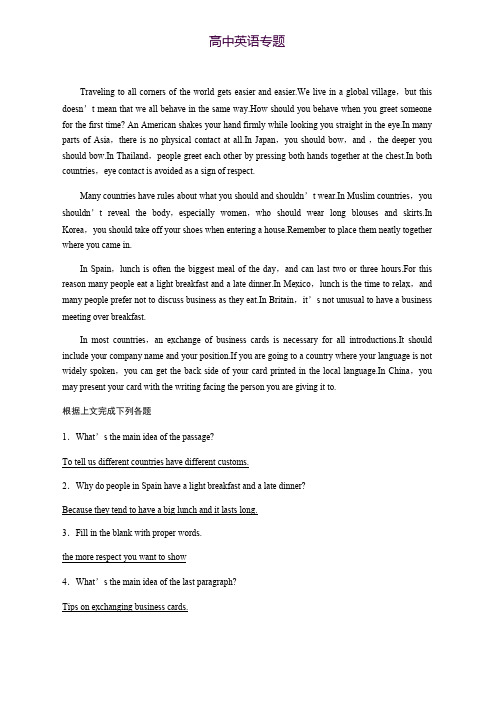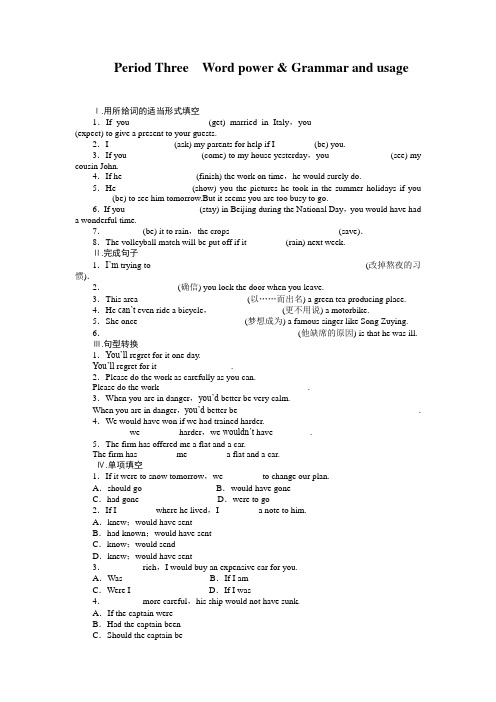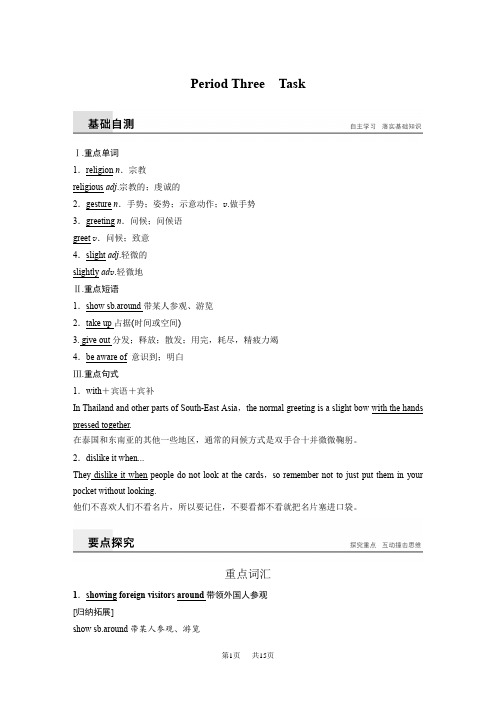牛津译林版2018选修六配套文档:Unit 3 Period Three Word版含答案
高中英语(牛津译林版)选修六配套文档Unit 3 Period One Word版含答案

Traveling to all corners of the world gets easier and easier.We live in a global village,but this doesn’t mean that we all behave in the same way.How should you behave when you greet someone for the first time? An American shakes your hand firmly while looking you straight in the eye.In many parts of Asia,there is no physical contact at all.In Japan,you should bow,and ,the deeper you should bow.In Thailand,people greet each other by pressing both hands together at the chest.In both countries,eye contact is avoided as a sign of respect.Many countries have rules about what you should and shouldn’t wear.In Muslim countries,you shouldn’t reveal the body,especially women,who should wear long blouses and skirts.In Korea,you should take off your shoes when entering a house.Remember to place them neatly together where you came in.In Spain,lunch is often the biggest meal of the day,and can last two or three hours.For this reason many people eat a light breakfast and a late dinner.In Mexico,lunch is the time to relax,and many people prefer not to discuss business as they eat.In Britain,it’s not unusual to have a business meeting over breakfast.In most countries,an exchange of business cards is necessary for all introductions.It should include your company name and your position.If you are going to a country where your language is not widely spoken,you can get the back side of your card printed in the local language.In China,you may present your card with the writing facing the person you are giving it to.根据上文完成下列各题1.What’s the main idea of the passage?To tell us different countries have different customs.2.Why do people in Spain have a light breakfast and a late dinner?Because they tend to have a big lunch and it lasts long.3.Fill in the blank with proper words.the more respect you want to show4.What’s the main idea of the last paragraph?Tips on exchanging business cards.Period OneWelcome to the unit & ReadingⅠ.重点单词1.greet v t.和某人打招呼(或问好)2. ensure v t.保证,担保,确保3.congratulate v t.向(某人)道贺,祝贺4.reception n.接待;接受;招待会5.permit v t.&v i.允许,准许;n.许可证permission n.允许6.prohibit v t.(尤指以法令)禁止7.throughout prep.&ad v.自始至终;贯穿整个时期;各处,遍及8.offence n.冒犯;侮辱offend v t.冒犯offensive adj.冒犯的9.adjust v i.&v t.适应,习惯;调整,调节adjustment n.调整10.accustomed adj.习惯于;惯常的accustom v t.使习惯于11.alike adj.相像,十分相似;ad v.十分相像地;同样地12.familiar adj.熟悉的;通晓的13.celebration n.庆祝活动;庆典celebrate v t.庆祝Ⅱ.重点短语1. as soon as一……就……2.be supposed to应该3. have trouble/difficulty (in) doing sth.做某事有困难4.get accustomed to (doing) sth.习惯于(做)某事;适应某事5.be familiar with熟悉,通晓6.take place发生7.after all 毕竟;终究8.on the other hand另一方面9.do without没有……也行;将就Ⅲ.重点句式1.it作形式主语,动名词为真正的主语It’s quite funny watching the new foreign teachers trying to adjust to doing that.看新来的外教努力适应这个动作的样子很有趣。
译林牛津版选修六Unit3 Period 3同步课时作业含答案解析

Period Three Word power & Grammar and usageⅠ.用所给词的适当形式填空1.Ifyou________________ (get) marriedinItaly,you________________________ (expect) togiveapresenttoyourguests.2.I______________ (ask) myparentsforhelpifI________ (be) you.3.Ifyou________________ (come) tomyhouseyesterday,you_____________ (see) mycousinJohn.4.Ifhe________________ (finish) theworkontime,hewouldsurelydo.5.He________________ (show) youthepictureshetookinthesummerholidaysifyou________ (be) toseehimtomorrow.Butitseemsyouaretoobusytogo.6.Ifyou________________ (stay) inBeijingduringtheNationalDay,youwouldhavehadawonderfultime.7.________ (be) ittorain,thecrops________________________ (save).8.Thevolleyballmatchwillbeputoffifit________ (rain) nextweek.Ⅱ.完成句子1.I’mtryingto________________________________________________(改掉熬夜的习惯).2.________________ (确信) youlockthedoorwhenyouleave.3.Thisarea________________________ (以……而出名) agreenteaproducingplace.4.Hecan’tevenridea bicycle,________________(更不用说) amotorbike.5.Sheonce________________________(梦想成为) afamoussingerlikeSongZuying.6.____________________________________________(他缺席的原因) isthathewasill.Ⅲ.句型转换1.You’llregretforitoneday.You’llregretforit________________.2.Pleasedotheworkascarefullyasyoucan.Pleasedothework________________________________.3.Whenyouareindanger,you’dbetterbeverycalm.Whenyouareindanger,you’dbetterbe________________ _______________________.4.Wewouldhavewonifwehadtrainedharder.________we________harder,wewouldn’thave________.5.Thefirmhasofferedmeaflatandacar.Thefirmhas________me________aflatandacar.Ⅳ.单项填空1.Ifitweretosnowtomorrow,we________tochangeourplan.A.shouldgoB.wouldhavegoneC.hadgoneD.weretogo2.IfI________wherehelived,I________anotetohim.A.knew;wouldhavesentB.hadknown;wouldhavesentC.know;wouldsendD.knew;wouldhavesent3.________rich,Iwouldbuyanexpensivecarforyou.A.WasB.IfIamC.WereID.IfIwas4.________morecareful,hisshipwouldnothavesunk.A.IfthecaptainwereB.HadthecaptainbeenC.ShouldthecaptainbeD.Ifthecaptainwouldhavebeen5.WereItodoit,I________itsomeotherway.A.willtodoB.woulddoC.weretodoD.wouldhavedone6.Ididn’tseeyouruncleattheparty.Ifhe________,hewouldhavesaidhellotome.A.wouldcomeB.hadcomeC.cameD.didcome7.—What’syouropinion?—________,I’dliketotakeajobasawaiterinarestaurant.A.IfIamyouB.IfIwouldbeyouC.IfIwereyouD.HadIbeenyou8.It’sapityTomisn’there.Ifhe________,wewouldbehappier.A.cameB.comesC.hadcomeD.hascome9.Ifthere________noelectricityinthefuture,ourlife________changealot.A.willbe;willB.is;willC.shouldbe;wouldD.wouldbe;would10.________hereferredtoinhisarticlewasunknowntothegeneralreaders.A.ThatB.WhatC.WhetherD.WhereⅤ.完形填空Peopledonotanalyzeeveryproblemtheymeet.Sometimestheytrytorememberasolutionfromthela sttimetheyhada__1__problem.Theyoftenaccepttheopinionsorideasofotherpeople.Othertimestheybe gintoactwithoutthinking;theytrytofindasolutionbytrialanderror.__2__,whenallofthesemethodsfail,thepersonwithaproblemhastostartanalyzing.Therearesix__3__inanalyzingaproblem.__4__thepersonmustrecognizethatthereisaproblem.Forexample,Sam’sbicycleisbroken,andhecannotrideittoclassasheusuallydoes.Sammust__5__thatthereisaproblemwithhisbicycle.Nextthepersonmustfindtheproblem.BeforeSamcanrepairhisbicycle,hemustknowwhyitdoesnotwork.Forexample,hemust__6__thepartsthatarewrong.Nowthepersonmustlookfor__7__thatwillmaketheproblemclearerandleadto__8__solutions.For example,supposeSamdecidesthathisbikedoesnotworkbecausethereissomethingwrongwiththebrakes.__9__,hecanlookinhisbicyclerepairbookandreadaboutbrakes,__10__hisfriendsatthebikeshop,orlookathisbrakescarefully.After__11__theproblem,thepersonshouldhave__12__suggestionsforapossiblesolution.TakeSamasanexample__13__,hissuggestionsmightbe:tightenorloosenthebrakes;buynewbrakesandchangetheoldones.Intheend,one__14__seemstobethesolutiontotheproblem.Sometimesthe__15__ideacomesquite__16__becaus ethethinkersuddenlyseessomethingneworseessomethingina__17__way.Sam,forexample,suddenlyseesthereisapieceofchewinggum(口香糖) stucktoabrake.He__18__hitsonthesolutiontohisproblem:hemust__19__thebrake.Finallythesolutionis__20__.Samdoesitandfindshisbicycleworksperfectly.Inshorthehassolvedth eproblem.1.A.serious B.usualC.similar D.common2.A.Besides B.InsteadC.Otherwise D.However3.A.ways B.conditionsC.stages D.orders4.A.First B.UsuallyC.Ingeneral D.Mostimportantly5.A.explain B.proveC.show D.see6.A.check B.determineC.correct D.recover7.A.answers B.skillsC.explanation D.information8.A.possible B.exactC.real D.special9.A.Inotherwords B.OnceinawhileC.Firstofall D.Atthistime10.A.lookfor B.talktoC.agreewith D.dependon11.A.discussing B.settlingdownC.comparingwith D.studying12.A.extra B.enoughC.several D.countless13.A.secondly B.againC.also D.alone14.A.suggestion B.conclusionC.decision D.discovery15.A.next B.clearC.final D.new16.A.unexpectedly B.lateC.clearly D.often17.A.simple B.differentC.quick D.sudden18.A.fortunately B.easilyC.clearly D.immediately19.A.clean B.separateC.loosen D.remove20.A.recorded B.completedC.tested D.accepted虚拟条件句的倒装:虚拟条件句的从句部分含有were,should,had时,可省略if,并把were,should或had 移到从句的句首,实行倒装。
最新牛津译林版高中英语选修六Unit 3《Understanding each other》(Period Three)课件2

大开眼界 沉重的负担,无用而累赘的东西 吹牛 凡人皆有得意时 爱屋及乌 班门弄斧
同行不相妒 一石双鸟,一箭双雕
ike a cat on hot brick let the cat out of the bag rain cats and dogs a dark horse crocodile tears
Remember the meaning of a word by studying the origin of the word.
Fast reading
These sentences summarize the article. Read them and decide if they are true or false. If it is false, please give the right information.
Guess the meanings of the following idioms
see the elephant white elephant talk horse Every dog has his day. Love me,love my dog. Teach fish to swim. Dog doesn‘t eat dog. kill two birds with one stone
French
Italian
Arabic
German
Language Categories of Cultural history words
French food, jobs entertainment,
once ruler of England; Cooking is one of their culture/way of life
高中英语(牛津译林版)选修六配套文档:Unit 3 Period Three Word版含答案

Period Three TaskⅠ.重点单词1.religion n.宗教religious adj.宗教的;虔诚的2.gesture n.手势;姿势;示意动作;v.做手势3.greeting n.问候;问候语greet v.问候;致意4.slight adj.轻微的slightly ad v.轻微地Ⅱ.重点短语1.show sb.around带某人参观、游览2.take up占据(时间或空间)3. give out分发;释放;散发;用完,耗尽,精疲力竭4.be aware of 意识到;明白Ⅲ.重点句式1.with+宾语+宾补In Thailand and other parts of SouthEast Asia,the normal greeting is a slight bow with the hands pressed together.在泰国和东南亚的其他一些地区,通常的问候方式是双手合十并微微鞠躬。
2.dislike it when...They dislike it when people do not look at the cards,so remember not to just put them in your pocket without looking.他们不喜欢人们不看名片,所以要记住,不要看都不看就把名片塞进口袋。
重点词汇1.showing foreign visitors around带领外国人参观[归纳拓展]show sb.around带某人参观、游览show off炫耀show up露面show sb.in/out带某人进来/出去[语境助记](1)They sent someone to show me around the new office.他们派人带我到新办公室看了看。
(2)The girl is always showing off her new clothes.这个女孩总是炫耀她的新衣服。
高中英语(牛津译林版)选修六课件:Unit 3 Period Three

relax v.→
adj.令人放松的
relaxingadj.放松的
relaxed n.放松
collect v.→relaxation n.收藏;收藏品
collection
C组 合成
n.+n.→billboardn.告示牌,广告牌
mythologyn.神话
n.发卡,发夹 he 4 Music
内容索引
Vocabulary Breakthrough
Step One 构词助 记
Step Two 词义助 记
Step Three 语境助 记
Step One 构词助记
A组 前缀
circle n.→semi-circlen.半圆 lay v.→relay v.转播,接转
本课结束
2.背诵经典 The poetic drama charmed him and made him relaxed;therefore he smiled with relief.
3.背诵经典 The pedestrian standing by the billboard patted the organ as if he could play it.
fascinate v.↔ v. charm
stage n.↔ n.
respect v.a&renn.a↔
v.
B组 形近词 honour
rhythm n.↔ n.押韵,韵
belief n.↔ rhynm.(e痛苦、忧虑等的)解除,减轻,调剂
relief
Step Three 语境助记
1.背诵经典 The voluntary passerby mopped his sweat and helped us plug the socket.
高中英语(牛津译林版)选修六配套文档:Unit 3 Period One Word版含答案

Unit 3 Period One Understanding each otherTraveling to all corners of the world gets easier and easier.We live in a global village,but this doesn’t mean that we all behave in the same way.How should you behave when you greet someone for the first time? An American shakes your hand firmly while looking you straight in the eye.In many parts of Asia,there is no physical contact at all.In Japan,you should bow,and ,the deeper you should bow.In Thailand,people greet each other by pressing both hands together at the chest.In both countries,eye contact is avoided as a sign of respect.Many countries have rules about what you should and shouldn’t wear.In Muslim countries,you shouldn’t reveal the body,especially women,who should wear long blouses and skirts.In Korea,you should take off your shoes when entering a house.Remember to place them neatly together where you came in.In Spain,lunch is often the biggest meal of the day,and can last two or three hours.For this reason many people eat a light breakfast and a late dinner.In Mexico,lunch is the time to relax,and many people prefer not to discuss business as they eat.In Britain,it’s not unusual to have a business meeting over breakfast.In most countries,an exchange of business cards is necessary for all introductions.It should include your company name and your position.If you are going to a country where your language is not widely spoken,you can get the back side of your card printed in the local language.In China,you may present your card with the writing facing the person you are giving it to.根据上文完成下列各题1.What’s the main idea of the passage?To tell us different countries have different customs.2.Why do people in Spain have a light breakfast and a late dinner?Because they tend to have a big lunch and it lasts long.3.Fill in the blank with proper words.the more respect you want to show4.What’s the main idea of the last paragraph?Tips on exchanging business cards.Period One Welcome to the unit & ReadingⅠ.重点单词1.greet v t.和某人打招呼(或问好)2. ensure v t.保证,担保,确保3.congratulate v t.向(某人)道贺,祝贺4.reception n.接待;接受;招待会5.permit v t.&v i.允许,准许;n.许可证permission n.允许6.prohibit v t.(尤指以法令)禁止7.throughout prep.&ad v.自始至终;贯穿整个时期;各处,遍及8.offence n.冒犯;侮辱offend v t.冒犯offensive adj.冒犯的9.adjust v i.&v t.适应,习惯;调整,调节adjustment n.调整10.accustomed adj.习惯于;惯常的accustom v t.使习惯于11.alike adj.相像,十分相似;ad v.十分相像地;同样地12.familiar adj.熟悉的;通晓的13.celebration n.庆祝活动;庆典celebrate v t.庆祝Ⅱ.重点短语1. as soon as 一……就……2.be supposed to 应该3. have trouble/difficulty (in) doing sth. 做某事有困难4.get accustomed to (doing) sth.习惯于(做)某事;适应某事5.be familiar with熟悉,通晓6.take place 发生7.after all 毕竟;终究8.on the other hand 另一方面9.do without没有……也行;将就Ⅲ.重点句式1.it作形式主语,动名词为真正的主语It’s quite funny watching the new foreign teachers trying to adjust to doing that.看新来的外教努力适应这个动作的样子很有趣。
牛津版高中英语选修6Unit3 Understanding each otherSection3 W

牛津版高中英语选修6Unit3 Understanding each otherSection3Welcome to the unit●Section 3 Words and expressions●Welcome to the unit1. Look at the pictures below and discuss the following questions with your partner. (P33)看下面的图画, 并与你的搭档讨论下面的问题.1) belowadv. 1) at or to a lower level, position or place 在或向较低处She looked down from the mountain to the valley below.2) under the surface 在地下The captain told the sailors to go below.prep. Lower than; under 在…下;低于Children below the age of 16 are not allowed to enter.2) followingadj. next (to be mentioned) 随后的The child was sick in the evening, but on the following day he seemed well again. prep. after an event or as a result of 在…之后Following the speech, there will be a few minutes for questions.2. In the Middle East, Arabs greet each other by touching noses. (P33) 在中东, 阿拉伯人的见面礼是互相碰鼻子.touchvt. 1) be or come together with 9sth. else) so that there is no space between 接触,触及One of the branches was touching the water.2) make (sb./sb.s feelings) sympathetic or sad 感动(某人); 触动(某人的感情)We were all deeply touched by his tragic experience.touch用作名词的相关短语:get in touch with 与…取得联系keep in touch with 与…保持联系lose touch with 与…失去联系out of touch with 与…不联系。
牛津译林版2018选修六配套文档:Unit 2 Period Three Word版含答案

Period Three TaskⅠ.重点单词1.obey v t.&v i.服从,听从,顺从2.outstanding adj.优秀的,杰出的,出色的3.talent n.天资,天赋;天才4.allocate v t.分配allocation n.分配5.adequate adj.足够的;合乎需要的6.quit v t.&v i.停止;放弃;离开7.uncertain adj.无把握的,不确定的certain(反义词) adj.有把握的,确定的certainly ad v.确定地,当然地Ⅱ.重点短语1. be/feel caught (between/in)陷入……之中;为……所困扰2.focus on集中于……3.have the talent to do sth.有做某事的天赋4.arrange to do sth.安排做某事5.work on从事,进行6.believe in信任7.feel like doing sth.想要做某事8.be tired of 厌倦Ⅲ.重点句式1.what引导名词性从句I’m an outstanding player,and running around on the basketball court is what makes me happy. 我是一个杰出的运动员,在篮球场上奔跑是使我高兴的事情。
2.whichever引导让步状语从句Whichever way I look at it,I’ll never be really good at anything unless I quit doing everything else.不管我以什么方式看待这件事,除非我放弃做别的一切事,要不然我真的什么也做不好。
3. have problems (in) doing sth.Many people have problems finding(find) enough time to study.很多人很难找到足够的时间来学习。
- 1、下载文档前请自行甄别文档内容的完整性,平台不提供额外的编辑、内容补充、找答案等附加服务。
- 2、"仅部分预览"的文档,不可在线预览部分如存在完整性等问题,可反馈申请退款(可完整预览的文档不适用该条件!)。
- 3、如文档侵犯您的权益,请联系客服反馈,我们会尽快为您处理(人工客服工作时间:9:00-18:30)。
Period Three Task
Ⅰ.重点单词
1.religion n.宗教
religious adj.宗教的;虔诚的
2.gesture n.手势;姿势;示意动作;v.做手势
3.greeting n.问候;问候语
greet v.问候;致意
4.slight adj.轻微的
slightly ad v.轻微地
Ⅱ.重点短语
1.show sb.around带某人参观、游览
2.take up占据(时间或空间)
3. give out分发;释放;散发;用完,耗尽,精疲力竭
4.be aware of意识到;明白
Ⅲ.重点句式
1.with+宾语+宾补
In Thailand and other parts of South-East Asia,the normal greeting is a slight bow with the hands pressed together.
在泰国和东南亚的其他一些地区,通常的问候方式是双手合十并微微鞠躬。
2.dislike it when...
They dislike it when people do not look at the cards,so remember not to just put them in your pocket without looking.
他们不喜欢人们不看名片,所以要记住,不要看都不看就把名片塞进口袋。
重点词汇
1.showing foreign visitors around带领外国人参观
[归纳拓展]
show sb.around带某人参观、游览
show off炫耀
show up露面
show sb.in/out带某人进来/出去
[语境助记]
(1)They sent someone to show me around the new office.
他们派人带我到新办公室看了看。
(2)The girl is always showing off her new clothes.
这个女孩总是炫耀她的新衣服。
[题组训练]
用适当的介、副词填空
(1)The servant showed the man in and served him with a cup of tea.
(2)He showed me around the school for three hours.
(3)She showed off her necklace before the public.
(4)The meeting is to start,but the chairman hasn’t shown up yet.
(5)When he didn’t know how to get out of the building,a boy showed him out.
2.I have no idea what he will do with them all,and it took up a lot of time.
我不知他怎么处理所有这些东西,这花费了很多时间。
[归纳拓展]
take up占用(时间或空间);开始从事;开始对……产生兴趣;接受;拿起;继续take apart拆卸;拆开
take in吸收;领会,理解;欺骗
take off (飞机)起飞;脱下;成功,成名
take on呈现;雇用;承担
take over接管
[语境助记]
(1)I’m sorry to have taken up so much of your time.
很抱歉占用了你这么多时间。
(2)It’s easy to take apart this camera,while putting the pieces together is quite difficult. 拆开这个照相机很容易,然而把这些零件再安装在一起却很困难。
(3)Who do you think will take over since the president has resigned?
总统退休了,你认为谁会接管他的工作呢?
[题组训练]
(1)写出下列句子中take up的汉语意思
①He took up the book and hurried to the lecture hall.拿起。
